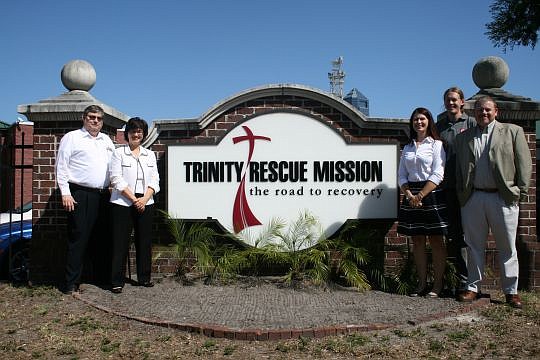
Like many community-service organizations, Trinity Rescue Mission was hurting.
It was 2011. The economy had not recovered from the recession. Providing food, shelter and hope for homeless people in Jacksonville was harder than ever.
“We needed help,” says Matt Heavener, Trinity’s development director.
To Trinity’s rescue came a brainy collaboration of servant leaders and college students that teaches nonprofits how to work smarter rather than harder.
Now operating in the black, Trinity’s resurgence and ability to fulfill its mission are largely a result of a Community Excellence Alliance and University of North Florida partnership, the organizations leaders say.
Using Six Sigma methodology, which embraces statistical analysis rather than guesswork for problem-solving, UNF engineering and business students team with alliance mentors to propose solutions to nonprofits’ challenges.
“There’s one thing about nonprofits that we have learned: When they run out of money, instead of looking at why and trying to find the real issues that can help them become financially efficient, they often just try to raise more money,” said UNF School of Engineering Director Murat Tiryakioglu, a principal in the collaboration.
Through seven projects, the partnership has helped Trinity exponentially increase the number of people it serves by changing policies, reducing the amount of fuel it buys, saving electricity and implementing other efficiencies.
The students even helped Trinity solve its longtime bedbug infestation problem.
Rick Denny, executive director for Trinity, said the students’ impact lasts longer than a semester.
“The solutions that they propose often last for years and equip us to help more people better,” he said.
Local process improvement professionals Rod Hill, Karen Cates and Michelle Boutwell started what would become the nonprofit CEA in 2010 as an outgrowth of the Jacksonville Six Sigma Symposium, a loose-knit volunteer group that has been taking on community projects since 1992.
“We’re all volunteers who want to help our community and we do that by helping nonprofits operate more efficiently,” says Hill, who has about 40 years’ experience transforming manufacturing companies and public utilities.
In seven semesters, the CEA-UNF partnership has taken on 37 community-focused projects that have benefited 14 Jacksonville-area nonprofits. The alliance says it conservatively estimates it has had at least a $4 million economic impact on the nonprofits.
The Jacksonville initiative has been replicated in Omaha, Neb., and recognized for its merits by the International Quality and Productivity Center in London, England.
“The positive impact for our nonprofit partners is unparalleled,” says Cates, a Northrop Grumman Corp. strategic partner. “Our projects have reduced operational costs, saved jobs, enhanced safety and improved logistics, thus enabling a re-focus of resources where they can have the most impact.”
Cates says in addition to furthering the participating nonprofits’ mission, the partnership teaches students to think beyond the classroom.
Jeri Millard says a UNF team recently helped improve insurance-claim processes at In the Pink, a nonprofit boutique she operates for fellow cancer survivors.
“They helped us develop a system that dings us when a claim is overdue and helped us identify $10,000 in claims that had not been filed,” Millard said. “To a small nonprofit like ours, their help was huge for us.”
The most significant beneficiary organization in Jacksonville has been Trinity.
“We’re not talking about tens of thousands of dollars, we’re talking about an impact of hundreds of thousands of dollars that have been saved by evaluating data and identifying problems in our processes — and helping us fix them,” Heavener says.
The collaboration works like this: Local nonprofits are invited to bring CEA their business and operational challenges, which are honed into 16-week projects designed by the alliance’s participants — all volunteers.
Each project is assigned to a team from UNF’s senior-level problem-solving and continuous improvement methods for engineers course.
The student teams are assigned alliance mentors and coached by the organization’s governing board members, along with Tiryakioglu and Dag Naslund, a professor at UNF’s Coggin College of Business.
Once the students define the problem, Tiryakioglu said, they develop a choice of multiple solutions for the nonprofits.
Many solutions require little – if any – money.
At Trinity, reversing a no-smoking policy dramatically increased participation in the organization’s 90-day Lifeline residential program. The UNF students were able to correspondingly help Trinity secure a grant that funded a successful smoking-cessation program.
“Now, more people are participating in Lifeline and fewer people in the program are smoking,” Tiryakioglu said.
The bed-bug dilemma was solved by installing a donated outdoor container for Trinity program participants’ belongings. Trinity had been prepared to spend $75,000 initially and $50,000 a year on an elaborate heat-treatment machine to kill bed bugs.
“The class transforms the way you think about solving problems,” says Mark McCombs, a 2012 UNF graduate. “People don’t teach you how to think anymore; they teach you insular things to do. Changing somebody’s mindset and how to attack a problem is an entirely different thing.”
McCombs says his experience in the class had a direct result on starting Renaissance Jax, a nonprofit that aspires to put robotics programs in all Northeast Florida schools.
“The class was a pivotal moment for me. I was able to sink my teeth into problem-solving, which is a foundation of my program,” he said.
Boutwell, project management director at ACI Worldwide, says it has been fulfilling to work with like-minded professionals and college students to improve the community.
“For me, the most unique thing is the absolute selflessness of everyone involved,” she says.